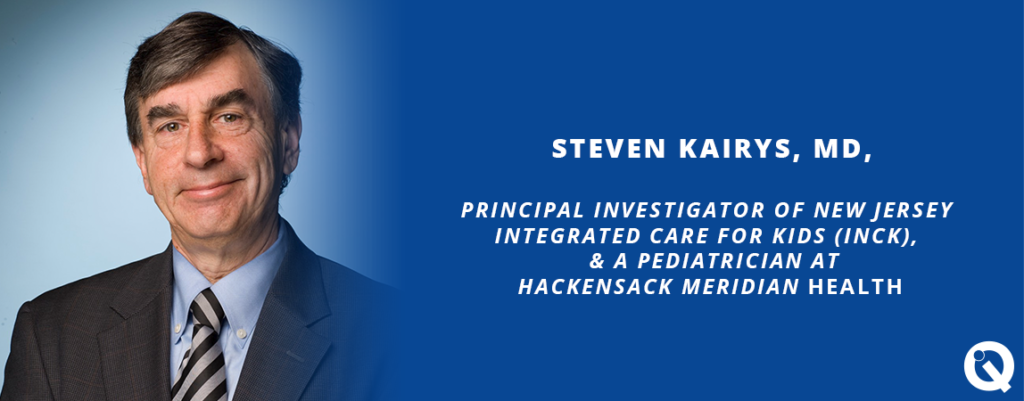Steven Kairys, MD, is Principal Investigator of New Jersey Integrated Care for Kids (InCK), a new pilot program in Ocean and Monmouth Counties, and a pediatrician at Hackensack Meridian Health, a member of the Quality Institute. The NJ InCK pilot is led by Hackensack Meridian Health with the Quality Institute and VNA Health Group as co-leads.
How will the NJ InCK pilot impact how care is delivered to children?
For children who have evidence of complex medical, behavioral, or social needs, or trauma-based backgrounds, we’ll be able to have advanced care management teams work with them directly and enable important information to flow back to the primary care offices. We want to break down the silos so that the schools and the community-based organizations and the medical community work together with the families to ensure comprehensive care. The vision is that we’ll be overseeing the care of all the children covered by NJFamilyCare in the two counties. And, using claims data and comprehensive needs assessments, we will identify those children who have a particularly high need for additional support and then provide that support.
How will pediatric reimbursement change under the NJ Integrated Care for Kids (InCK) pilot?
The alternative payment model has two parts. The first part is additional support to pediatricians and the family doctors for doing a much more comprehensive assessment of the children and the families who receive NJFamilyCare who come to their offices. The second part of the model is paying for a care team to provide coordination for community health services for high-risk children, such as those with complex medical, behavioral, or social needs. The funds will support the NJ InCK pilot’s Advanced Case Management Team, a multi-disciplinary group including community health workers, social workers, family support specialists, and child life specialists. The alternative payment model provides a monthly payment for care coordination for each high-risk family enrolled in this NJ InCK service.
What other entities at the community level need to be involved to support the patients and families?
The goal is to integrate care. We have a Partnership Council where the community-based organizations that work with these kids — from daycare, to schools, to legal services, to mental health organizations, to anti-poverty groups, to community health intervention — meet with us regularly to make sure that we are on the same page and that they’re involved in the decisions. There will be an evaluation process of how the pilot is working to help children and to reduce certain types of interventions, such as hospitalizations or out-of-home placements, which are very costly. Our main goal, though, is for children to do better regarding both their health and their overall well-being.
How will this innovative model address some of the challenges faced by the children you see?
Let’s say we have a child who has a complex medical condition. Perhaps the child has inflammatory bowel disease or type 1 diabetes or has complicated epilepsy or developmental issues. And perhaps there’s also behavioral issues because of all that, such as school difficulties. They would be identified as a family that could really benefit from additional services. Care Integration Managers working with this NJ InCK model reach out to the families to understand better what’s happening and whether the family is being supported by any other care coordination or case management models. Then, with the family’s permission, they’ll assign them to a care team that will work with them to come up with a shared care plan that they work on together.
That plan may include having our community health workers, our family support specialist, or child life specialist work with the families on breaking down some of the barriers that are preventing them from getting the kind of support they need. Maybe the challenges are transportation, day care, housing … maybe food. Then we work together to find the resources the families need and try to empower the families to improve their capacity to provide care for those children. These are needs beyond what a pediatrician can typically manage in a busy practice, with a busy schedule of sick and well visits. The hope is that by improving care for the child using a family-centered care coordination approach, including community partners in the plan, we will also reduce unnecessary ED visits, hospitalizations, and out-of-home placements.
We like to ask a question about our interviewees’ lives outside of their professional capacity. So where might we find you on a day away from work?
My wife and I have seven grandchildren. We are usually with family. And if I have time for myself, I write. I write both poetry and creative nonfiction of medicine.

